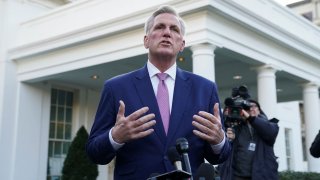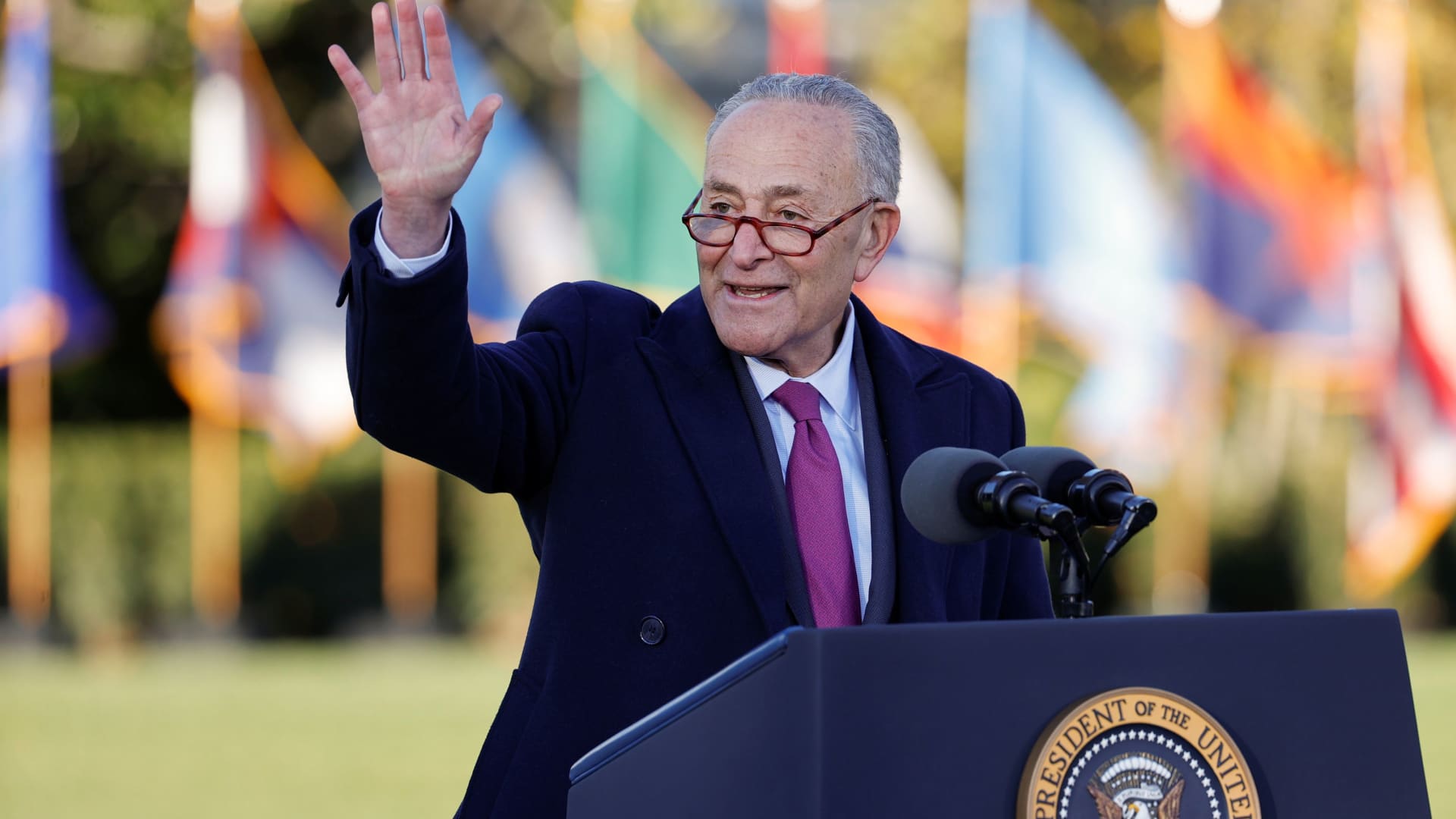
- House Speaker Kevin McCarthy said he had a "very good discussion" with President Joe Biden at the White House about the looming debt ceiling deadline and federal spending.
- The White House shared a similar sentiment, saying the pair had a "frank and straightforward dialogue."
- McCarthy said financial markets should be encouraged by the meeting, as the U.S. tries to avoid a first-ever default on its debt.
WASHINGTON — House Speaker Kevin McCarthy said he had a "very good discussion" with President Joe Biden at the White House on Wednesday about the looming debt ceiling deadline and federal spending.
"We have different perspectives. But we both laid out some of our vision of where we'd want to get to. And I believe, after laying them both out, I can see where we can find common ground," McCarthy told reporters at the White House after the meeting.
The Democratic president and the California Republican talked for more than an hour, and while there were "no agreements" and "no promises," McCarthy said they would continue their conversation. The White House readout of the meeting reflected McCarthy's sentiments, stating the two had a "frank and straightforward dialogue" as part of an ongoing conversation.
Get New England news, weather forecasts and entertainment stories to your inbox. Sign up for NECN newsletters.
The Biden administration repeated a familiar phrase that the president is "eager to continue working across the aisle in good faith," but stressed that he does not intend to negotiate on lifting the debt ceiling.
"It is their shared duty not to allow an unprecedented and economically catastrophic default," the White House statement read. "The United States Constitution is explicit about this obligation, and the American people expect Congress to meet it in the same way all of his predecessors have. It is not negotiable or conditional."
The House speaker later said the meeting had exceeded his expectations. McCarthy added he believes investors should feel encouraged about the prospect of an agreement to avoid a first-ever default on U.S. debt.
Money Report
"I would feel better, if I was the markets, based upon the meeting I had today," he said, according to Punchbowl News.
The Treasury Department has launched a series of extraordinary steps to keep paying the government's bills, and it expects those measures will be enough to avoid default at least until early June. But if Congress doesn't raise or suspend the debt limit by then, it could wreak economic havoc around the world.
McCarthy has held the position that the two parties need to agree to cut back on spending before lifting the debt ceiling. The White House said the president agrees that addressing the national debt is a priority, but it should be a separate conversation.
"The President welcomes a separate discussion with congressional leaders about how to reduce the deficit and control the national debt while continuing to grow the economy. This conversation should build on the President's leadership in delivering a record $1.7 trillion in deficit reduction in his first two years in office," the administration statement said.
For House Republicans, however, that's a non-starter. They view a vote to increase the government's borrowing power and their demands for cuts to government spending as inextricably linked.
"If you have a child, and you give them a credit card and they spend it to the limit, you're responsible for paying that credit card. But the responsible thing to do going forward is not just to raise the limit, but look at how you're spending," said McCarthy.
This comparison has become a familiar line from the speaker, the implication being that while House Republicans don't intend to let the United States default on its debt, they will insist on changes to how much money the government spends.
But just what those changes would be remains a mystery, and an area of contention within the House Republican caucus.
Asked by reporters at the White House what spending cuts he was seeking, McCarthy replied, "I'm not going to go negotiate this in the press."
Over the coming months, McCarthy's job is to build consensus within his caucus on what spending cuts he should push for during debt ceiling negotiations.
It's a task further complicated by the fact that not all of his GOP caucus members share his belief that the government must raise the debt ceiling at all.
Several fiscal hard-liners in the House have already made it clear they're willing to force a default on the national debt if they don't get massive spending cuts in return for passing it.
The trouble with these demands is that any debt ceiling bill the House approves must also be able to win 60 votes to pass the Democratic-controlled Senate before the president can sign it into law.
In the Senate, the sort of draconian spending cuts sought by some far-right House Republicans would have no chance of passing.
On Wednesday, Democratic Senate Majority Leader Chuck Schumer of New York reminded the House speaker of his challenge.
"For days, Speaker McCarthy has heralded this sit-down as some kind of major win in his debt ceiling talks," Schumer said on the Senate floor. "Speaker McCarthy, if you don't have a plan, you can't seriously pretend you're having any real negotiations."

McCarthy's task of uniting his unruly caucus behind one plan would be difficult under any circumstances. But it's all the more challenging because his majority in the House is so slim.
If the speaker were to try to pass a House debt ceiling bill with only Republican votes, he could only afford to lose four members of his caucus and still reach the 218-vote majority needed to pass the legislation.
He could also try to craft a debt ceiling bill that would pass with votes from more moderate Republicans and a large bloc of Democrats.
Betting on members of the opposing party to bail him out would be risky. But not as dangerous as failing to lift the debt ceiling altogether.
For both Democrats and Republicans, however, the worst-case scenario remains that of an unprecedented U.S. government default on its debt, one that could halt daily operations within the federal government and quickly ripple through equity markets and the broader economy.
A Moody's Analytics report last year said a default on Treasury bonds could throw the U.S. economy into a tailspin as bad as the Great Recession. If the U.S. were to default, gross domestic product would drop 4% and 6 million workers would lose their jobs, Moody's projected.






